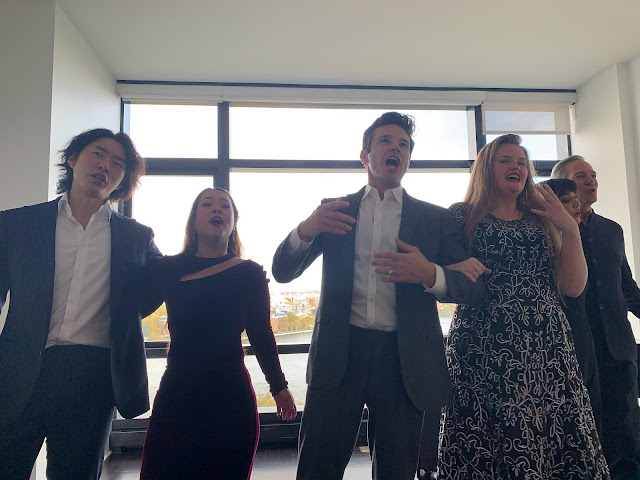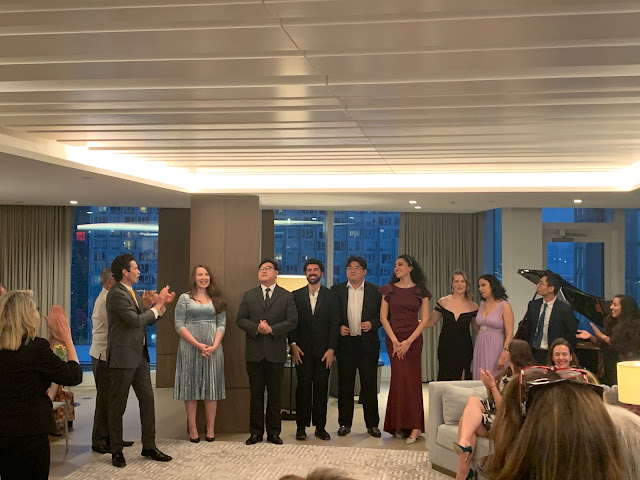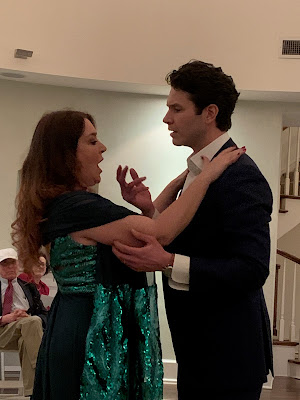Enes Pektas as Michele
With his typical modest manner, Glenn Morton, Director of Classic Lyric Arts Vocal Academy, introduced CLAVA's debut opera performance at The Blue Gallery. As a member of the audience we are not obligated to be modest. As a matter of fact, we are over the moon about a completely engaging performance of Il Tabarro, one third of Puccini's Il Trittico. The singing was stellar with major roles performed by members of CLAVA and supporting roles cast with graduates of CLA's immersive summer programs in Italy, France, and The Berkshires.
Adding to the immeasurable vocal thrills of the evening were three factors. The finely tuned direction of Daniel Isengart (a CLAVA Faculty Member) told the timeless story with specificity of detail and characterological honesty. The conducting by Maestro Michelle Rofrano built the intensity of Puccini's score to a fever pitch, relaxing only briefly for the dancing scene. The piano artistry of Doug Han who, by some kind of magic, created all the colors of the orchestra.
Mr. Isengart's stage direction was so specific that our guest, who speaks no Italian, was able to relate the story to us after the curtain. And no, he did not read the synopsis. This was an experiment because there were no projected titles. Not only was the story well told, but each character was believable, evoking memories of real people.
As Michele, the Captain of the barge, we heard baritone Enes Pektas, whose Master's Degree recital we recently reviewed. (You can, Dear Reader, enter his name in the search bar if you missed the review.) His acting was so intense and brooding that we lost sight of the artist as someone we have seen and heard before. He actually became the character and we felt the pain of being betrayed. Although Giuseppi Adami's libretto is set a century ago, the story is a timeless one. The narcissistic injury endured by a man in a loveless marriage unable to retain his wife's affection can easily turn to murderous rage. That story is not unknown today. The sullen vocal color infused Mr. Pektas' portrayal whilst he preserved his beautiful tonal quality and phrasing.
As his unhappy wife Giorgetta, soprano Sara Stevens (also reviewed several times this year for her performances as a Master's Degree student at Manhattan School of Music) turned in a most affecting performance. By means of vocal coloration she demonstrated the coldness she felt for her much older husband and the feminine energy she projected with Luigi, a stevedore on the barge. By some fine acting one could sense that she and her lover had a past that they shared. Indeed they both came from the same suburb of Paris and probably grew up together. All this was conveyed with facial gesture and posture, but probably came from a deep belief in the character.
There was the lighthearted side of Giorgetta as well, when she brought wine to the stevedores and danced. There was even a funny moment when Tinca (played by John Viscardi, once a CLA student but now Coach and Artistic Director) tried clumsily to dance with her and stepped on her toes.
The character of Luigi the lover was wisely drawn by tenor David Freides who was careful not to make him too sympathetic. Did he deserve his fate? That was left for the viewer to decide. That he sang with beautiful tone might have prejudiced the audience to more sympathy than he deserved.
It is said in the theater that there are no small parts and that seems to be true in opera as well. As evidence we offer the fine performance of mezzo-soprano Sofia Durante as La Frugola who comes on board with trinkets and gossip that she shares with Giorgetta. She immersed herself so completely in this voluble role that it took us a few minutes to recognize her as someone we have heard in concert several times before.
As her husband Talpa, Alejandro De Los Santos made an equally fine showing. The carefree domestic affection between this pair served as counterpoint to the tense relationship between Michele and Giorgetta. This is something we never perceived before and for this we thank the direction.
As far as the setting, there is no actual stage in The Blue Gallery. A metal bar stretched horizontally across the playing area and we had no trouble perceiving it as the railing of the barge. Stevedores toting large boxes across the stage added to the illusion and reminded us that much can be accomplished with minimal material resources and a lot of imagination.
The minor characters were portrayed by Samuel Ng and Sofia Gotch singing from behind the audience and in a space up near the ceiling. This was not a problem since it served to focus attention on the major characters. Costuming was minimal and timeless.
Everything served to show us that opera is theater with gorgeous voices. Famous names and elaborate sets are not as important as the music and the storytelling, of which we had the very best!
A couple years ago the late and lamented On Site Opera produced this same opera at The Seaport (review can be found in the search bar) with action taking place on a ship and the audience seated on the dock. We enjoyed the realism but the voices required amplification. This made last night's performance even more valuable as we heard Puccini's vocal lines delivered with musicality and authenticity.
Without the obligation of bringing in famous names to fill a huge theater, opera can once again be restored to its original function and we applaud this aim. This opera was chosen by CLAVA, not to please an audience, but because they had the right singers for the roles. Would this model work for a small opera company in Manhattan? We very much think so and will be first in line for their next venture. Was this experience valuable for the young artists who participated in CLAVA? We definitely think so. Academic institutions cast them in contemporary operas no one else will ever produce, or in weird productions of great operas. But to get a chance to perform in an authentic production of a great opera means that they can sing these roles anywhere in the world. And we hope that they will!!!!!
© meche kroop












